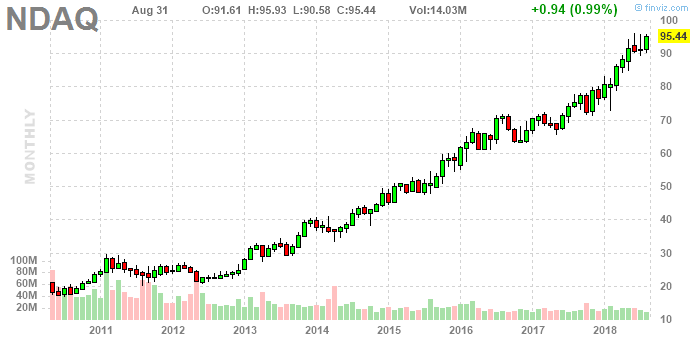Subscribe! Want to stay up-to-date with all of our posts? Sign up for our daily e-mail newsletter and get all the good stuff when it comes out.
Quote of the Day
"You are 2.0 software running in 200,000 year old hardware...There is nothing you can do to change that — at least until we start genetically biohacking ourselves."
(Scott Bell)
Chart of the Day

We all know the QQQs have been doing well, but what about the Nasdaq ($NDAQ) itself?
Strategy
- On the paradox of expertise, finance edition. (theirrelevantinvestor.com)
- If you have to buy individual stocks, do like Kanye does. (humbledollar.com)
Technology
- Amazon's ($AMZN) Alexa is now built into 20,000 some devices. (cnet.com)
- When do Chromebooks begin to bite Microsoft ($MSFT)? (arstechnica.com)
- Goodbye Facebook ($FB), forever. (om.co)
Finance
- The Permian Basis runs on cheap debt and private equity capital. (nytimes.com)
- If IPOs were easier to conduct, private investing wouldn't be so attractive. (pragcap.com)
Funds
- Alphabet ($GOOGL) and Facebook ($FB) are going to dominate the newly defined 'communications' sector. (barrons.com)
- Things that don't make sense: mutual fund share splits. (wsj.com)
Behavior
- The biases that tell our brain things are worse than they are. (wsj.com)
- You can't go around questioning everything in your life. That's where heuristics kick in. (nytimes.com)
Economy
- A hint that current economic growth will get revised lower. (econbrowser.com)
- A succinct summary of the week's economic events. (ritholtz.com)
- The economic schedule for the coming holiday-shortened week. (calculatedriskblog.com)
Earlier on Abnormal Returns
- Top clicks this week on the site. (abnormalreturns.com)
- What you missed in our Saturday linkfest. (abnormalreturns.com)
- Longform links: skimming vs. reading. (abnormalreturns.com)
Mixed media
- Why you should try to increase your sample size when making a decision. (fs.blog)
- Science advances one anomaly at a time. (blogs.scientificamerican.com)
- Steven Johnson, "Only 15 percent of the decisions he studied involved a stage where the decision makers actively sought out a new option beyond the initial choices on the table." (nytimes.com)








